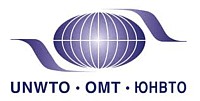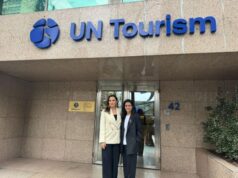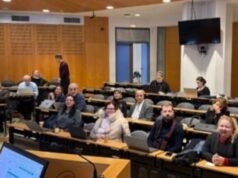 Since 2007, close to fifty UNWTO Volunteers have been working on tourism development projects around the world to make a difference to the lives of local communities. As the world celebrates the United Nations International Volunteers Day (5 December), UNWTO is proud to be taking an active role in maximizing tourism’s contribution to the Millennium Development Goals (MDGs) through its Volunteers Programme.International Volunteer Day 2010 is being celebrated under the theme ‘Volunteering for the MDGs’, highlighting how volunteerism can tip the balance towards meeting the MDGs, the globally-agreed targets to slash poverty, hunger, disease and other social ills, all by 2015.
Since 2007, close to fifty UNWTO Volunteers have been working on tourism development projects around the world to make a difference to the lives of local communities. As the world celebrates the United Nations International Volunteers Day (5 December), UNWTO is proud to be taking an active role in maximizing tourism’s contribution to the Millennium Development Goals (MDGs) through its Volunteers Programme.International Volunteer Day 2010 is being celebrated under the theme ‘Volunteering for the MDGs’, highlighting how volunteerism can tip the balance towards meeting the MDGs, the globally-agreed targets to slash poverty, hunger, disease and other social ills, all by 2015.
Tourism is a major economic sector and driver of development for many developing countries. It contributes directly and through its immense multiplier effects on other sectors, such as agriculture or handicrafts, to economic growth, job creation, particularly in remote regions, and export earnings. International tourism accounts for as much as 45% of the exports of services in developing countries.
The UNWTO.Themis Foundation’s Volunteers Programme is actively contributing to the MDGs through promoting tourism as an instrument for development and through the education and training of volunteer professionals and their engagement in tourism development projects around the world.
UNWTO Volunteers: helping small rural hotel entrepreneurs in Nicaragua to tap into the global travel market
Among the many ongoing projects, UNWTO Volunteers working on the UNWTO Sustainable Tourism – Eliminating Poverty (ST-EP) project “Enhancing Rural and Community-based Tourism Initiatives in Masaya and Granada” in Nicaragua, are currently making it possible for two rural community tourism initiatives to become part of the Amadeus project “Corporate Social Responsibility Technology Transfer Project: Small Hotels Distribution”.
Through the project, two establishments, “Albergue Comunitario Nicaragua Libre” and “Casa Comunal La Granadilla”, will reach a wider market on a cost effective basis. The establishments will receive laptops and the necessary technical training to allow them to be connected to the global market and permanently update their room availability. The project thus brings important economic benefits to the businesses concerned, as well as to the wider community through the sustainable growth in tourism, the central aim of the UNWTO ST-EP initiative.
The distribution through travel agencies provided by Amadeus, one of the leading transaction processors for the tourism sector, is otherwise unreachable for small hotels, considering the costs involved and will be carried out free of charge on a local scale until a certain volume of sales is reached. The Amadeus Programme of Social Responsibility further includes education and training for the hotel’s management and personnel, through its own staff or specially trained UNWTO Volunteers, in order that the technology can be used to its fullest potential.
In addition to providing technical guidance and advice, UNWTO Volunteers working on this project present a liaison between Amadeus and the beneficiaries of UNWTO projects. This involves the identification of gaps in projects in which Amadeus can provide effective solutions, as well as dealing with and mediating between beneficiaries’ and Amadeus.











